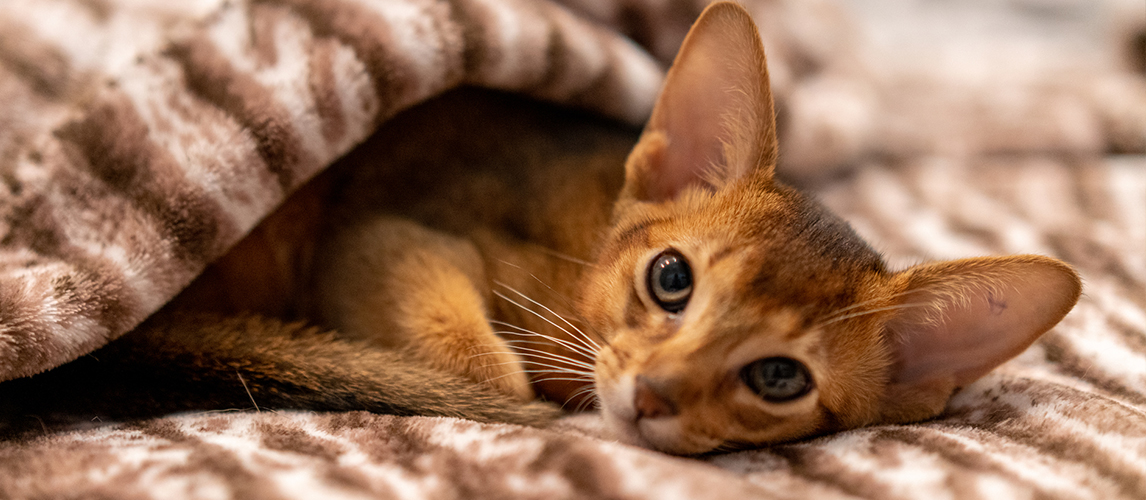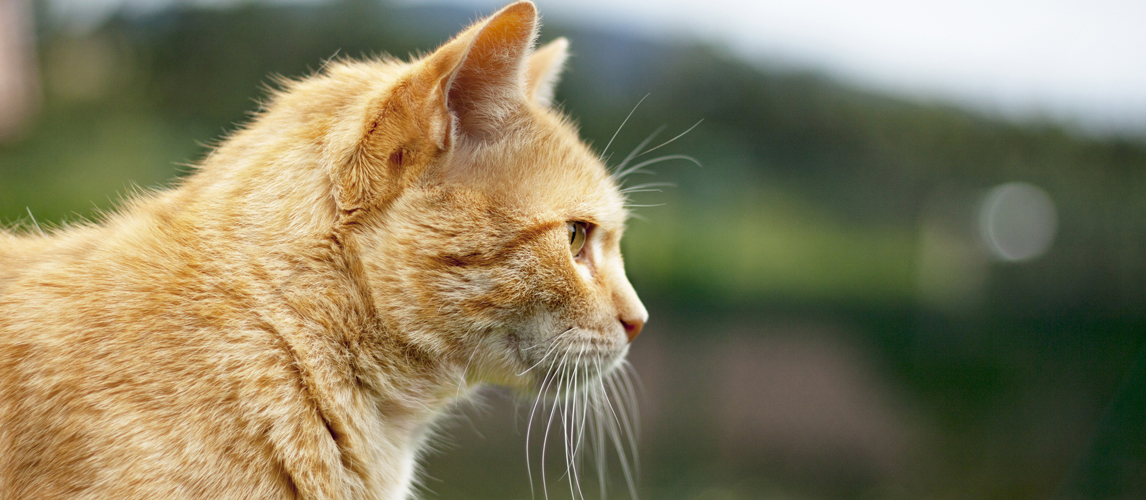Everybody yawns. In fact, you’re probably yawning right now, simply because you read the word ‘yawning’. It’s an involuntary reflex for us. If we see someone yawn, we’re likely to yawn as well. As well as people, many other animals yawn, from cats and dogs, to chimps, to birds and fish. But why do we all yawn?
Yawning Theories
There’s a number of theories on why we yawn, but any, and all of them may be true.
- Tired
We yawn when we’re tired. The thinking behind this is that when we’re tired, we don’t breathe as deeply as we normally would. This means that our bodies are taking in less oxygen, but yawning brings in a quick, sizeable burst of oxygen, moving more carbon dioxide out of the blood.
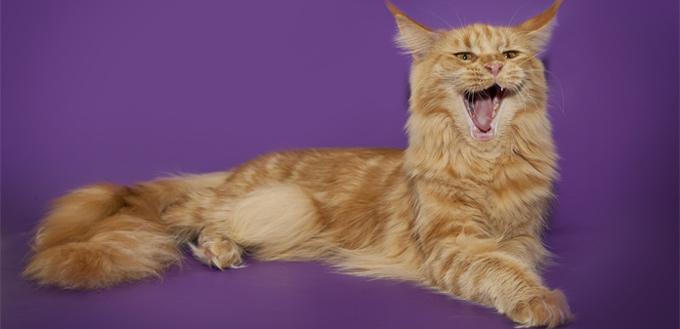
Another theory on why we yawn when we’re tired is that it stretches the lungs, and increases the heart rate. Or it redistributes the oil-like coating inside the lungs.
Whichever reasoning is true, yawning is a completely involuntary action.
- Boredom
Some theories suggest that some of our yawns may be because we’re bored. Similar to some of the tiredness theories, it’s possible that when we’re bored, we don’t breathe as deeply as we would when we’re doing something we find interesting.
- Evolution
Another theory is that yawning is an evolutionary leftover from our more primitive days. It’s possible that yawning was used as a sign of dominance. The idea is that it may have been something similar to a dog snarling, and showing teeth.
- Cooling
A much more recent theory on yawning is that we do it to cool our brains. Yawning expands and contracts the sinuses which would let cooler air push over the brain.
Cats and Yawning
All of that is very interesting, but why do cats yawn? Well, some of the reasons are similar, but cats may also use yawning as a method of communication. They have a few different yawns, each of which signifies something different.
- Stretch and Yawn
This yawn is probably the most closely related to a human yawn. Just as we yawn and stretch when we wake up, so does a cat. Many scientists believe that this yawn is designed to get the body started with a sharp intake of oxygen.
- Irritation
You might notice that if your cat is sleeping, and you pet him, he yawns. You may even see him yawn if you stroke him while he’s grooming, or doing something. This type of yawn is showing that he’s irritated about being interrupted. You may even see this yawn if you do nothing more than walk into the room, or turn on a light if he’s been enjoying a nap. Some cats will follow up this yawn with a swipe of their paw, while others will simply go back to doing what they were doing. Either way, this yawn is to let you know that he’s a little annoyed.
- Stress Relief
Cats aren’t as domesticated as we would like to believe, and part of this means that, generally, they aren’t capable of coping with some of the stresses of domestic life.
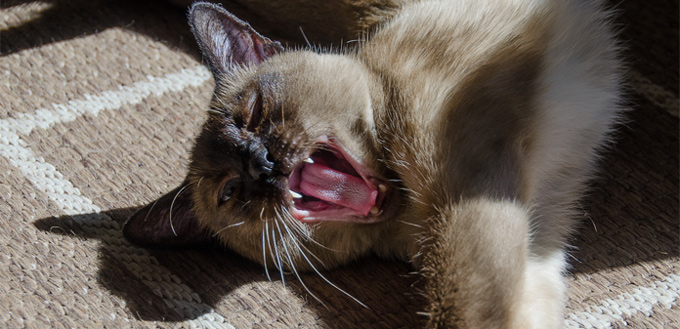
For example, when an owner shouts at a badly behaved cat, the cat will probably yawn, with his eyes wide open. This yawn is to relief the stress he’s feeling. Your cat will probably yawn like this if he’s in any situation that he finds to be stressful.
- Relaxation
Another type of yawn is the relaxed yawn. When your cat is relaxed, content and generally happy with his surroundings, he’ll close, or half close his eyes and yawn. You may see this yawn if you’re sitting with him, stroking with him, or bonding with him in some way.
- Excessive Yawning
Sometimes, a cat yawning can be a sign that there’s something wrong. In most cases, yawning is down to one of the reasons above, but on occasion, it can mean that a trip to the vet’s is needed.
- Oral Discomfort
Cats are notorious for trying to hide that they are in pain. Again, this is down to them not being as domesticated as some of our other pets. A cat in pain is viewed as weak and vulnerable, so many cats won’t even vocalize their pain or discomfort. Owners need to watch for other signs, such as excessive yawning if he has some sort of oral discomfort.
There will usually be other signs to watch for as well as yawning.
- Bad breath – This isn’t normal and can be a symptom of a number of oral conditions.
- Unusual eating behavior – If your cat is eating oddly, dropping food, or only eating on side of his mouth, then he’s probably having oral pain. Another sign may be that he seems hungry, and interested in his food bowl, but is refusing to eat.
- Drooling – Excessive drooling can also be a sign of oral discomfort, and there may even be blood present in the saliva.
- Pawing at the mouth – Some cats will paw at the site of the pain, or shake their heads repeatedly.
- Won’t let you touch it – Some cats love to have their faces, and the sides of their mouths massaged, but if your cat has suddenly gone off this, then there could be something wrong with the inside of his mouth.
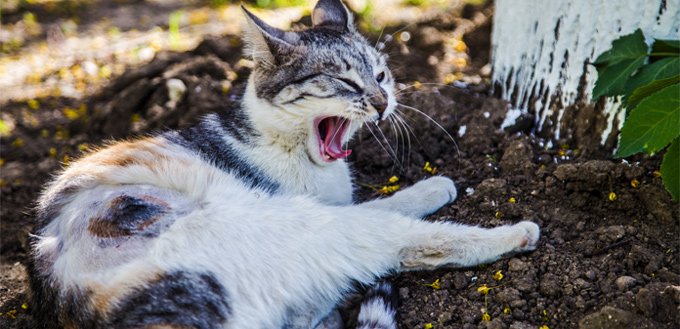
These symptoms will often require a trip to the vet, and some treatment.
Generally though, if a cat is yawning, then it’s a perfectly normal behavior. He may be tired, bored, or trying to communicate with you. Interestingly, however, while humans may have used yawning as a communication tool in the past, when we yawn, it’s contagious. Anyone who sees the yawn feels compelled to yawn as well. If another cat sees your cat yawn, it won’t feel the same need to yawn at all.
Sources:
- Dave Donovan, Excessive Yawning in Cats, The Nest
- Dr. Patty Khuly VMD, Why Does My Cat… Yawn So Much?, VetStreet
Note: The advice provided in this post is intended for informational purposes and does not constitute medical advice regarding pets. For an accurate diagnosis of your pet's condition, please make an appointment with your vet.



